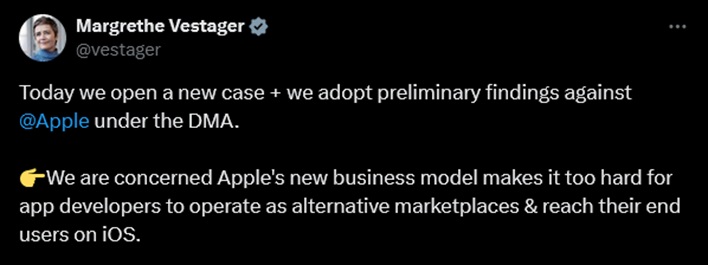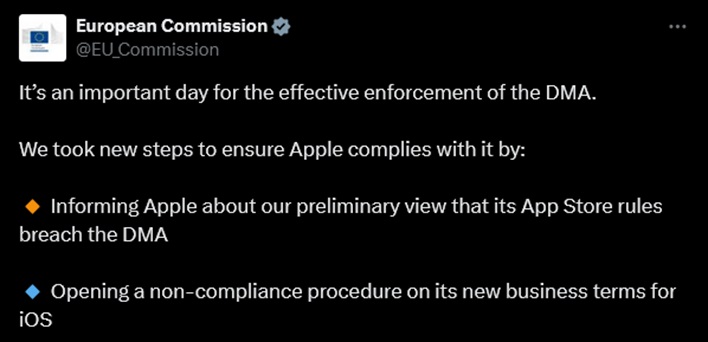EU Accuses Apple Of Violating DMA Rules With App Store’s Walled Garden
Apple, Meta, and Alphabet (parent company of Google) were all three put on alert by the European Commission earlier this month that the companies were potentially in violation of the Digital Markets Act. Now, the EC has finished its preliminary view of possible violations by Apple, informing the Cupertino-based company it was indeed in breach of the DMA. The Commission also announced that it had opened a new non-competitive procedure against Apple because of concerns its latest contractual requirements for third-party app developers and app stores fall short of making sure “effective compliance with Apple’s obligations under the DMA.”
In terms of what the Commission has found Apple in violation of, it listed three sets of business terms governing its relationship with app developers, including the App Store’s steering rules. The preliminary findings indicated: None of these business terms allow developers to freely steer their customers.
- 1. For example, developers cannot provide pricing information within the app or communicate in any other way with their customers to promote offers available on alternative distribution channels.
- 2. Under most of the business terms available to app developers, Apple allows steering only through “link-outs”, i.e., app developers can include a link in their app that redirects the customer to a web page where the customer can conclude a contract. The link-out process is subject to several restrictions imposed by Apple that prevent app developers from communicating, promoting offers and concluding contracts through the distribution channel of their choice.
- 3. Whilst Apple can receive a fee for facilitating via the AppStore the initial acquisition of a new customer by developers, the fees charged by Apple go beyond what is strictly necessary for such remuneration. For example, Apple charges developers a fee for every purchase of digital goods or services a user makes within seven days after a link-out from the app.
Fortunately for Apple, it still has time to answer to the findings made by the European Commission. However, if the findings are “ultimately confirmed,” the Commission would then adopt a non-compliance decision within 12 months from the opening of proceedings on March 25, 2024.
As far as the new investigations into Apple, the Commission listed three areas it would look into. Those include:
- Apple’s core technology fee.
- Apple’s multi-step user journey to download and install alternative app stores or app on iPhone.
- The eligibility requirements for developers.
To add to Apple’s DMA woes, the company recently announced it would not be rolling out its new AI features in Europe because of concerns they would somehow violate the DMA. Some believe the move could be to pressure people in Europe to push back against the EU and the DMA. If true, Apple will have up to 12 months to see if the pressure tactic has any influence.




